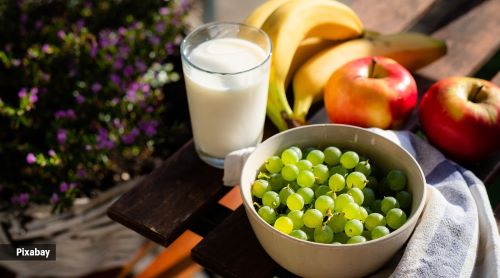Are you a fan of milk and fruit smoothies or overnight oats with milk and fruits? Then what you are having is Viruddha Ahara or incompatible food. There are some food combinations that, when consumed with milk, can negatively affect the body. According to Ayurveda, having Virrudha Ahara is believed to cause many health problems. How different foods can affect each other and cause illness According to Caraka Samhita – one of the ancient Ayurvedic texts, certain types of food can disrupt the body’s metabolism and the process of tissue formation. Incompatible foods are called these. Eating food in the wrong way – that is combining foods that don’t go together, processing the food in the wrong way, eating too much or too little of it, eating it at the wrong time of day or eating it in the wrong season can also affect your gut health. The way different foods interact with each other can differ. Many times, combining certain foods is fine, but it is good to be aware of possible interactions. The word Viruddha means the opposite. It seems like eating certain foods together can affect how they taste. Different characteristics Opposite activities to the body’s cells. It could have adverse effects on the body if processed in a specific manner. It might cause harmful effects if used together in the wrong amount. It might cause problems if taken at the wrong time. Having Viruddha Ahara can cause inflammation in the body at a molecular level. Ancient Ayurvedic texts like Caraka Samhita and Sushruta Samhita mention different types of food incompatibilities. Eating certain food combinations can be bad for your body. It has the potential to impact your immune system, cell functioning, growth hormone levels, and dehydroepiandrosterone sulphate (DHEAS) hormone. Viruddha Ahara ( Incompatible food ) combinations Here are some food combinations that are not compatible. Milk + Jaggery Jaggery is a common substitute for sugar in milk for many individuals. While it may seem like a good option, in Ayurveda, combining jaggery with milk is considered harmful to the digestive system. This has the potential to irritate your stomach. You may have seen influencers recommending jaggery as a sugar replacement for tea. Ayurvedically, this combination increases Pitta and Kapha. Use rock sugar (mishri) instead. Rock sugar, referred to as Mishri in Hindi, is a small, crystal, unprocessed variety of sugar. This nutritious sweet, known as Bhura sugar or Khand in various regions, is created by cooking sugarcane juice until it solidifies. It is a suitable replacement for regular sugar or jaggery. Mishri formulates to digest more easily and provides a cooling sensation to the body due to its unique crystallization process. After a delicious meal, it’s common for us to consume rock sugar and fennel to aid in digestion. It also helps to freshen your breath. This little sweet treat is great for your overall health. Milk + Sour fruits One of the Ayurvedic texts, Yogaratnakara, mentions this combination is as good as POISON for the gut! Yogaratnakara is a text that discusses Ayurvedic concepts, practices, and techniques. It also contains remedies for various ailments. The book is unique in that it provides insights into the evolution of medical knowledge from antiquity to the late 17th century. Eating a variety of foods at once can overtax your body and lead to digestive issues. This could result in the creation of toxic substances within your body. If consumed individually, these foods might aid in digestion and potentially promote fat loss. Consuming mismatched foods can lead to nausea, bloating, and unpleasant odours in your digestive system, potentially resulting in severe illness. One such combination is having sour fruits like grapes, pineapple, oranges, strawberries, watermelon, bananas, and the list goes on. Eating bananas with milk can potentially impair your digestion, alter gut bacteria, produce harmful substances in your body, and potentially lead to symptoms like a stuffy nose, cold, cough, or allergies. Both bananas and milk are delicious and refreshing, but once digested, bananas turn sour, while milk turns sweet. It can create a sense of confusion in our stomach and body, potentially causing harmful substances, allergies, and other challenges. Furthermore, refrain from consuming milk and melons simultaneously. Milk consumption can lead to excretion while eating melon can result in urination. It takes longer for the body to digest milk. Milk+ Non-vegetarian food As per Ayurveda, it is said that this deadly combination causes skin diseases, indigestion, and other gastroenterological diseases. Combining milk and chicken or any other non-vegetarian food may not be ideal as they have different protein compositions that digest differently. Consuming milk and chicken simultaneously can produce harmful compounds in the body. Some individuals may find it challenging to digest. This could lead to increased acidity in the stomach, making digestion more challenging. You can also feel stomach ache, nausea, indigestion, ulcers, constipation and acid reflux. Milk+ Sea salt Have you ever considered the reason behind using sugar instead of salt in the milk? The reason for this is that salt and milk do not complement each other. They possess contrasting characteristics. Adding milk to curries and sauces can unknowingly cause harm to our bodies. Consuming these food mixtures may not immediately result in feeling unwell. However, prolonged consumption of unhealthy foods can lead to the development of health issues over time. The consumption of milk may result in a feeling of being cold, whereas salt can lead to a sensation of being hot. Combining them can be harmful to your health as they counteract one another. A typical combination used in pancakes and breads. Long-term use leads to impaired digestive fire! If you must add salt, use rock salt instead! Milk + Green gram Green gram, also known as mung bean or moong, is a legume plant. The plant belongs to the Fabaceae family; furthermore, it is… Continue reading Viruddha Ahara – 5 combinations with milk you must avoid
Viruddha Ahara – 5 combinations with milk you must avoid
